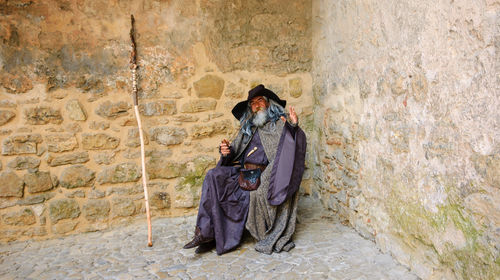I want to be cool like Gandalf in the Lord of the Rings movies. I’ve tried to grow a beard, though, and it never turns out as well for me as it did for him.
And I don’t know how well it would fly if I wore my hair that long.
It’s just as well. Even if I had the hair and the beard, they wouldn’t make me as cool as Gandalf.
In a Middle Earth full of wizards, what sets him apart is not his hairstyle, but his wisdom. He’s known as Gandalf the Wise, and his judgments prove him worthy of the name.
Wisdom is what I want. Really, it’s what we all want. As the good book says: “Happy the one who finds wisdom, the one who gains understanding!”
People put up with Gandalf’s grumpiness and gruffness because they can count on him to tell the truth. His words, they know, will reflect reality. He won’t lie to flatter them. He won’t hold back the thing that’s hard to say.
Christians and Jews have always put a lot of stock in wisdom. We see it as both a gift and a virtue. On the one hand, it’s a grace from God — a gift of the Holy Spirit (Isaiah 12:2). We ask for it, and God grants it.
On the other hand, it’s a habit we need to form. God wants us to be wise, and he gives us the raw materials for wisdom. But he won’t force us to be wise.
Wisdom is a choice. It’s a gift we choose to receive — or choose to reject. We need to make the choice for wisdom every day — and many times a day. Wisdom “is readily perceived by those who love her, and found by those who seek her” (Wisdom 6:13). We need to make the effort.
But what exactly is wisdom? It’s not just “knowledge.” It’s not “book learning.” You’ve probably known people who hold advanced degrees with straight A’s all the way through, but seem to register zero on the wisdom scale. You probably also know people who have little formal education, but are renowned as wise in the neighborhood or parish.
Wisdom, according to our tradition, is the ability to judge rightly in everything that has to do with life and conduct. It’s the ability to judge by divine standards — and it’s the habit of acting on those judgments.
People who are wise are not fearless. But they order their fears and place the fear of the Lord above all other fears.
People who are wise love the world and all the things of this world. But they give these things only the love that’s due, subordinating all to the love of God.
Wisdom, according to the old seminary textbooks, is the intellectual virtue concerning the first or highest causes of all things. Wisdom is the gift and the habit of ordering everything to God. He alone is the first cause. He alone is our final end. He alone is the giver of all gifts. He alone is the judge of all souls.
When we are wise, we acquire the habit of referring everything to the Creator. Only then can we move with confidence through creation.
Only then, maybe, will I be cool like Gandalf — even if I can’t quite match the beard or hair.

